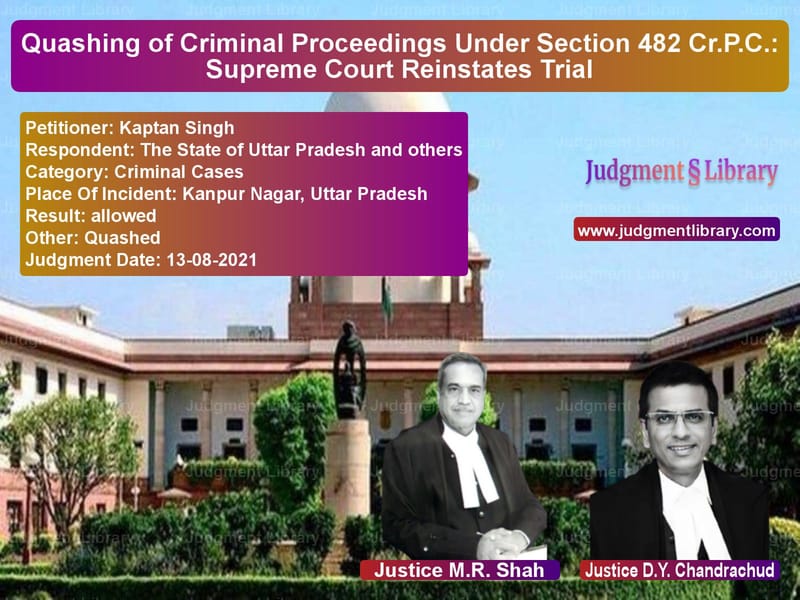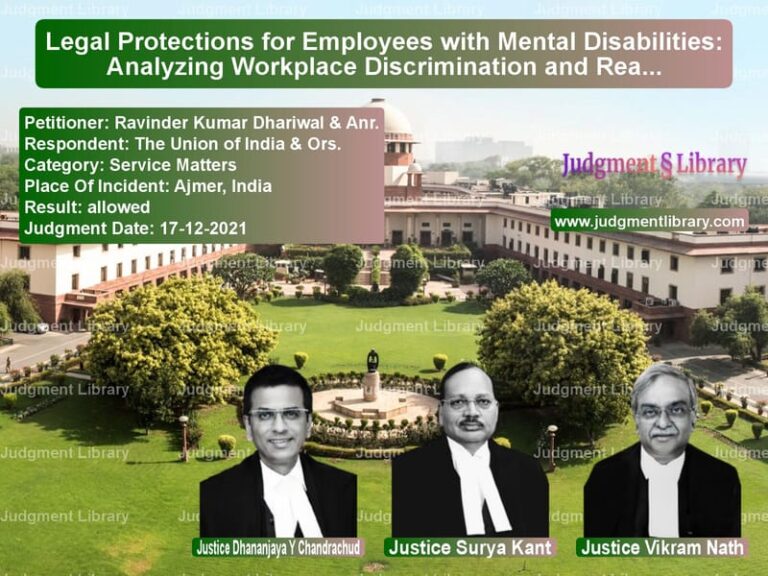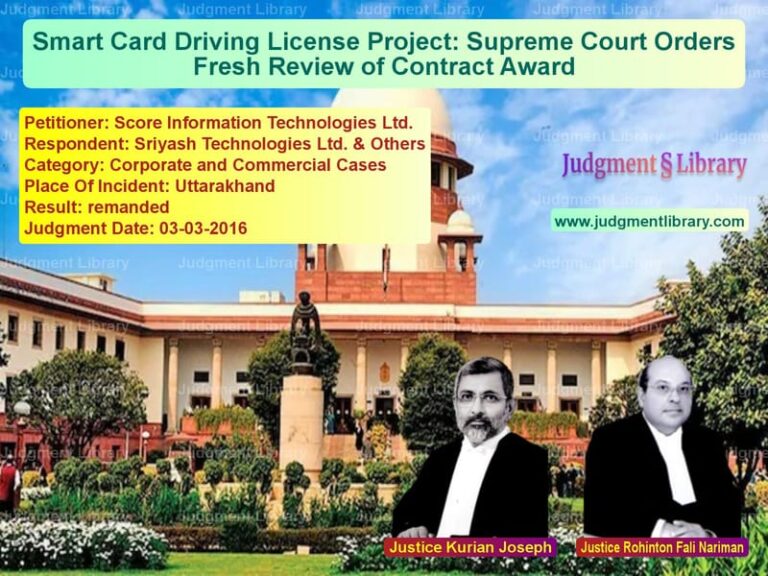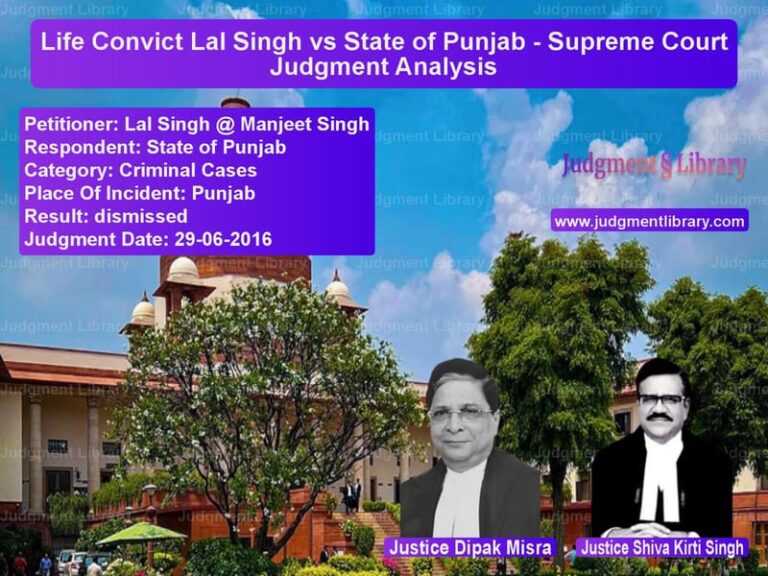Quashing of Criminal Proceedings Under Section 482 Cr.P.C.: Supreme Court Reinstates Trial
The case of Kaptan Singh vs. The State of Uttar Pradesh and others revolved around the High Court’s quashing of criminal proceedings under Section 482 of the Code of Criminal Procedure (Cr.P.C.). The Supreme Court was called upon to determine whether the High Court had exceeded its jurisdiction by prematurely interfering in a criminal case that had reached the chargesheet stage. Ultimately, the Supreme Court reinstated the criminal proceedings, emphasizing that serious allegations and triable issues must be examined during the trial.
Case Background
Kaptan Singh, the original complainant, filed a criminal complaint against the respondents, alleging offenses under Sections 147, 148, 149, 406, 329, and 386 of the Indian Penal Code (IPC). The complaint stemmed from a dispute over a plot of land owned by Munni Devi, for which Kaptan Singh was granted power of attorney. Munni Devi had entered into a registered agreement to sell the plot to Mamta Gupta, one of the respondents, for Rs. 25,00,000. However, only part of the consideration was allegedly paid, and the sale deed was never executed.
Read also: https://judgmentlibrary.com/murder-conviction-upheld-supreme-courts-ruling-in-bihar-criminal-case/
When Munni Devi attempted to reclaim the plot, the respondents allegedly used criminal force, including threats, physical assault, and coercion, to prevent her representative, Kaptan Singh, from taking possession of the land. An FIR was registered, and after an investigation, the police filed a chargesheet confirming the allegations.
However, the respondents moved the Allahabad High Court under Section 482 Cr.P.C., seeking quashing of the criminal proceedings on the ground that the dispute was of a civil nature. The High Court accepted their plea and quashed the proceedings, leading to an appeal before the Supreme Court.
Arguments of the Petitioner (Kaptan Singh)
The petitioner, represented by legal counsel, presented the following key arguments:
- The High Court erred in quashing the proceedings when a valid FIR had been registered, and an investigation had been conducted.
- “The investigating officer, after recording statements of witnesses and accused persons, and after collecting material evidence, had found a prima facie case against the accused and had accordingly filed a chargesheet.”
- The High Court overstepped its jurisdiction by interfering with the trial process and pre-judging the case.
- “The presence of civil litigation does not automatically preclude criminal prosecution. A dispute may have both civil and criminal aspects.”
- The accused had allegedly committed acts of criminal intimidation, extortion, and wrongful restraint, which warranted a full trial.
Arguments of the Respondents
The respondents, on the other hand, maintained that:
- “The case was purely a civil dispute regarding the execution of a sale deed, and the criminal proceedings were initiated only to harass the accused.”
- “Munni Devi had agreed to sell the plot and had already received Rs. 25,00,000, as evidenced by a notarized affidavit dated 27.10.2010.”
- “No entrustment of property had taken place, and thus, there was no case for breach of trust under Section 406 IPC.”
- “The High Court had correctly quashed the proceedings to prevent the misuse of criminal law in a matter that was essentially civil in nature.”
Supreme Court’s Analysis
The Supreme Court examined whether the High Court had exceeded its jurisdiction by quashing the criminal proceedings. It reaffirmed the established principles for exercising jurisdiction under Section 482 Cr.P.C., as set forth in State of Haryana vs. Bhajan Lal, which laid down limited circumstances under which criminal proceedings could be quashed.
Read also: https://judgmentlibrary.com/supreme-court-clarifies-premature-release-policy-for-life-convicts/
The Court noted:
- “The High Court was not justified in quashing the criminal proceedings merely on the ground that a civil suit was pending.”
- “When an FIR leads to an investigation, and material evidence is collected, including witness statements and a chargesheet, the case must ordinarily proceed to trial.”
- “The presence of a notarized affidavit stating that Rs. 25,00,000 was paid does not conclusively establish payment. It is a matter for trial.”
- “Serious allegations, including physical assault, coercion, and threats, cannot be ignored as mere civil disputes.”
Key Judicial Observations
The Court emphasized:
- “If there are serious triable allegations, they must be examined at the trial stage and not prematurely quashed at the High Court level.”
- “The High Court, while exercising jurisdiction under Section 482 Cr.P.C., cannot engage in an in-depth examination of the evidence as if it were conducting a trial.”
- “The presence of a civil suit does not ipso facto mean that criminal prosecution cannot be pursued, especially where elements of criminality, such as fraud, coercion, or violence, are alleged.”
- “By quashing the proceedings, the High Court had effectively denied the complainant an opportunity to prove the allegations in a court of law.”
Supreme Court’s Judgment
Based on the above analysis, the Supreme Court ruled:
- “The impugned judgment and order of the High Court quashing the criminal proceedings are set aside.”
- “The trial shall proceed in accordance with law, without being influenced by any observations made by the High Court.”
- “The trial court shall decide the case on its own merits based on the evidence presented.”
Conclusion
The Supreme Court’s decision reaffirmed that High Courts must exercise extreme caution while invoking their inherent powers under Section 482 Cr.P.C. The presence of civil litigation does not automatically negate criminal liability, particularly in cases where allegations of coercion, fraud, or violence are involved. By allowing the trial to proceed, the Court ensured that the complainant’s claims would be adjudicated on their merits, rather than being dismissed prematurely.
Petitioner Name: Kaptan Singh.Respondent Name: The State of Uttar Pradesh and others.Judgment By: Justice M.R. Shah, Justice D.Y. Chandrachud.Place Of Incident: Kanpur Nagar, Uttar Pradesh.Judgment Date: 13-08-2021.
Don’t miss out on the full details! Download the complete judgment in PDF format below and gain valuable insights instantly!
Download Judgment: kaptan-singh-vs-the-state-of-uttar-p-supreme-court-of-india-judgment-dated-13-08-2021.pdf
Directly Download Judgment: Directly download this Judgment
See all petitions in Fraud and Forgery
See all petitions in Attempt to Murder Cases
See all petitions in Extortion and Blackmail
See all petitions in Judgment by Mukeshkumar Rasikbhai Shah
See all petitions in Judgment by Dhananjaya Y Chandrachud
See all petitions in allowed
See all petitions in Quashed
See all petitions in supreme court of India judgments August 2021
See all petitions in 2021 judgments
See all posts in Criminal Cases Category
See all allowed petitions in Criminal Cases Category
See all Dismissed petitions in Criminal Cases Category
See all partially allowed petitions in Criminal Cases Category







